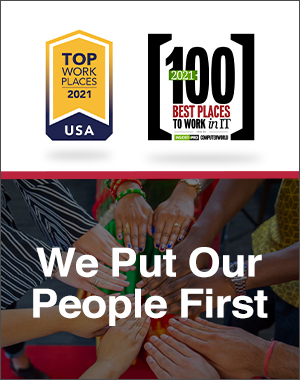
The influence of technology in home healthcare is constantly growing, introducing new efficiencies and improvements in patient care as it evolves. A panel of healthcare and technology experts convened at the 2024 Axxess Growth, Innovation and Leadership Experience (AGILE) to discuss how the latest technology is impacting the current healthcare landscape.
Andrew Olowu, Chief Technology Officer at Axxess, moderated the session with panelists Annie Erstling, Chief Operating Officer at Forcura; Mickel Mirchandani, Co-Founder and Chief Executive Officer at Skyra.ai; Jim Catrett, Chief Information Officer at Security Compliance Associates; and Phillip McMillan, Chief Executive Officer at American River Healthcare.
The panel focused on three key areas: artificial intelligence (AI), cybersecurity and connectivity.
Artificial Intelligence
“I think the key to AI is figuring out how to use it in a way that can have real, meaningful impact today,” Erstling said. “Think about using generative AI. You can analyze disparate information sources so quickly and the impact that that can have on things like staffing and scheduling and clinical decision-making is pretty amazing.”
Erstling shared insights into how Forcura leverages generative AI to summarize referral packets, aiding in better resource allocation and service delivery.
“AI can help us QA our notes in a much more efficient way to ensure that our clinicians are documenting the standard that Medicare is wanting and expecting for us to be documenting,” McMillan added. “We have to leverage technology to make us more efficient and for our nurses and clinicians to be able to spend more time with the patient providing great care than documenting.”
Cybersecurity
Mirchandani stressed that while AI is a powerful assistive tool, organizations should implement safeguards to ensure sensitive data remains protected. He advocated for the role of a security compliance officer to oversee and ensure the integrity of data protection practices, acknowledging that while thorough security measures might slow operations, they are crucial and well worth the effort.
“Security cannot be taken lightly,” Mirchandani said. “It is extremely important. We’re dealing with very, very sensitive data, and while I think AI is still evolving, even at our organization we have a security compliance officer who’s looking through everything. And, yes, it could slow you down from time to time, but it is worth it. It’s absolutely worth it.”
Catrett discussed the value of Health-ISAC, a threat collaboration forum created by the Federal Bureau of Investigation (FBI) to offer healthcare stakeholders a trusted community for sharing physical and cyber threat intelligence.
“The FBI … created these factions of what they call … threat collaboration forums,” Catrett said. “For those of you in the healthcare industry, it’s readily available. It’s Health-ISAC. And … what it’s really intended to do is for you to kind of assess what vulnerabilities are out there in your marketplace, what other providers might be experiencing. … So, a lot of the things that we’re talking about today, whether it’s anything related to AI, APIs, any of the workflows, any of the movement of data … where it’s being extracted … that’s all going to show up on these forums, and the good news is that is free for people in the healthcare industry and it’s an excellent source.”
Erstling reminded the audience that no one is immune to security risk and encouraged attendees to partner with technology providers that adhere to stringent security protocols.
“For us, that HITRUST certification is really a stamp of approval [that] means that we have rigorous security protocols and practices,” Erstling said. “Not all of the technology vendors you work with will have that, but I think making sure that they have the security practices and protocols in place that are going to keep that data as safe as possible is something that you should look at when you talk to anybody.”
Connectivity
Erstling urged attendees to choose technology partners that act as connectors to bridge operational gaps.
“The key to a sustainable, patient-centric healthcare system is connectivity,” Erstling said.
She explained how Forcura acts as a connector in linking home healthcare organizations to referring physicians and then ensuring physicians have seamless oversight of their referred patients. Technology partners, she says, should bridge these process gaps and act as resources to bring organizations the latest, most cutting-edge technologies.
“You should lean on your technology partners,” Erstling said. “They should be real partners and they should keep you abreast of what’s the latest and greatest.”
Mirchandani added that while not all technologies will be suitable for every organization, the willingness to experiment can lead to significant breakthroughs that propel organizations forward.
“Some of the technologies that you may try may not be the right one for you, may not work out, and that’s fine,” Mirchandani said. “Fail fast. Fail often. But when you succeed, you will truly leapfrog.”
With more than 350 attendees, more than 50 sponsors and countless connections made, AGILE 2024 was a massive success for everyone. Check out this recap video.
